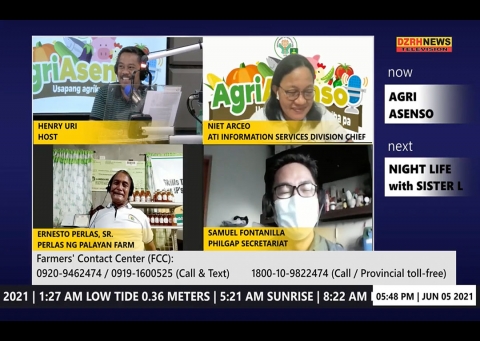Program hosts Henry Uri of DZRH and ATI-Information Services Division chief Antonieta Arceo talk about the benefits of PhiGAP certification with farmer Ernesto Perlas, Sr. and BPI representative Samuel Fontanilla.
DILIMAN, Quezon City—The latest episodes of “Agri Asenso”, Agricultural Training Institute’s (ATI) teleradyo program with DZRH, center on the importance of compliance to local food safety standards and biosecurity protocols especially on health and business perspectives.
In the episode last June 5, program hosts Henry Uri of DZRH and ATI-Information Services Division chief Antonieta Arceo, engaged the listeners and viewers in a conversation with a practitioner of the Philippine Good Agricultural Practices (PhilGAP) and cooperator of a Learning Site for Agriculture (LSA) in Nueva Ecija, Ernesto Perlas, Sr., together with Bureau of Plant Industry (BPI) representative, Samuel Fontanilla.
During the interview, Perlas talked about how PhilGAP compliance expanded and improved his market for the fruits and vegetables that he produces in his farm.
“PhilGAP [certification] is always an advantage especially now that consumers’ awareness on food safety is increasing,” he said.
His farm, Perlas ng Palayan, received PhilGAP certification for rice, calamansi, butterfly pea (blue ternatea), lemon grass, dragon fruit, banana, papaya, and cashew in 2017, which was renewed in 2019.
According to Perlas, the certification requirements and process are all manageable even for smallholder farms. With this, he urged his fellow farmers to avail of this free certification and adopt local food standards to ensure the safety and quality of their produce.
Fontanilla, likewise, shed light on the objective behind the certification program. He explained that this is being spearheaded by the BPI to ensure on-farm food safety and environmental protection, as well as to facilitate local and international market access of agricultural crops.
The guest expert cited the minimum farming standards on produce quality, environmental management, workers’ health and welfare, and food safety.
“PhilGAP ensures the correct use of fertilizers and pesticides and that these do not harm the environment. We also check workers’ health and hygiene and the cleanliness of the packing facility and the equipment used during harvest to make sure that there is no microbiological contamination,” he added.
At present, there are a total of 859 farms in the country that are PhilGAP-certified. Interested farmers can contact their local government or the nearest regional field office of the Department of Agriculture for the application process.
Meanwhile, the previous episode last May 29 was on organic native pig production which also focused on biosecurity protocols.
Engr. Edelissa Ramos, LSA cooperator in Candelaria, Quezon, served as the guest expert. She emphasized that proper housing and feeding requirements, as well as appropriate farm management practices, should be prioritized for the safety and sustainability of livestock animals.
Moreover, she underscored the essence of having the right knowledge in starting any agribusiness venture. She advised aspiring native pig raisers to “start small, but dream big.”
“Agri Asenso” airs on DZRH 666 kHz every Saturday at 5PM. It can be streamed live through the network’s and the ATI’s Facebook pages.

